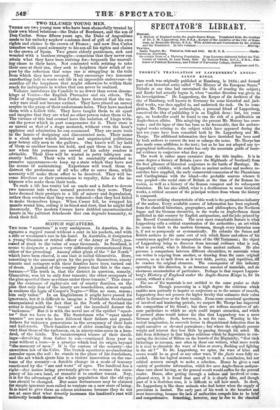SCOTCH SQUATTERS.
THE term “ squatters" is very ambiguous. In America, it de- signates a ragged rascal without a cent in his pockets, and with a rifle or woodman's axe in his hand. In Australia, it designates a young Oxonian or retired officer of the Army or Navy, pos- sessed of stock to the value of some thousands. In Scotland, it seems to designate a person very differently circumstanced from either of the preceding. Among other glens of the " far North" which have been cleared, is one that is called Glenculvie. Here, according to the account given by the people themselves, ninety tenants and cottagers with their families have been turned out of doors. A journal of the country denies that this is the case; because—" The truth is, that the district in question, namely, Glenculvie, was let to only four tenants; the other occupants of the glen squatted there as cotters under these tenants." This deny- ing the existence of eighty-six out of ninety families, en the plea that only four of the ninety are leaseholders, almost equals in coolness the logic of Cooper's Negro—" Him no man, massa ; him only tailor." In an Englishman it might have passed for ignorance, but it is difficult to imagine a Perthshire Scotchman unacquainted with the fact that in the North of Scotland the cotter is designated the "tenant" and the leasehold farmer the " tacksman." But it is with the novel use of the epithet " squat- ter " that we have to do. The Scotchmen who "squat under tenants" are men who have followed their fathers and grand- fathers for unknown generations in the occupancy of their huts and kail-yards. Their families are of older standing in the dis- trict than those of the tacksmen, or, in ninety-nine cases in a hun- dred, of the lairds. The uninterrupted tenure of their dwell- ings—devolving from father to son—continued from year to year without a lease—is a practice which had its origin beyond "the memory of man." It is the custom of the country—the unwritten law of the Celts. The Scotch squatter is no clandestine intruder upon the soil : be stands in the place of his forefathers, and the act which ejects him is a violent innovation on the cus- toms of the country—a forcible change in a mode of tenancy sanctioned by the use and wont" of ages. The landlord has a right—due notice being previously given—to resume the occu- pancy of his own land, or transfer it to another tenant. Nay, it is for the advantage of the whole population that the old sys- tem should be changed. But some forbearance may be claimed for simple ignorant men called to venture on a new state of being. It is hard to give them an odious nickname because they do not see at once that what directly increases the landlord's rent will indirectly benefit themselves.


























 Previous page
Previous page